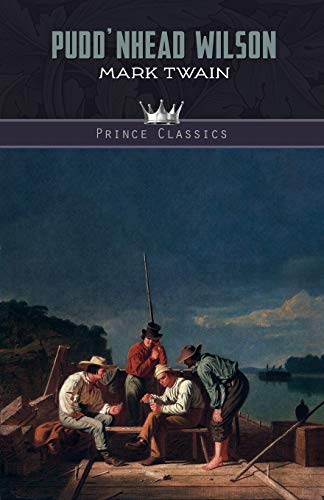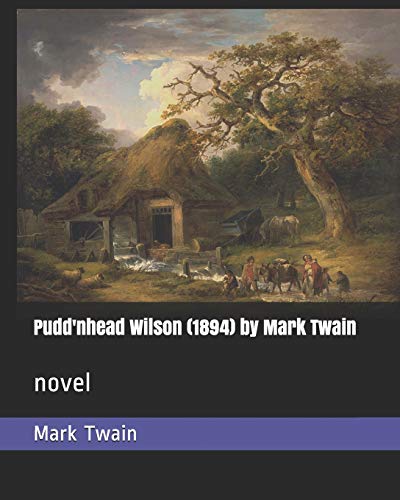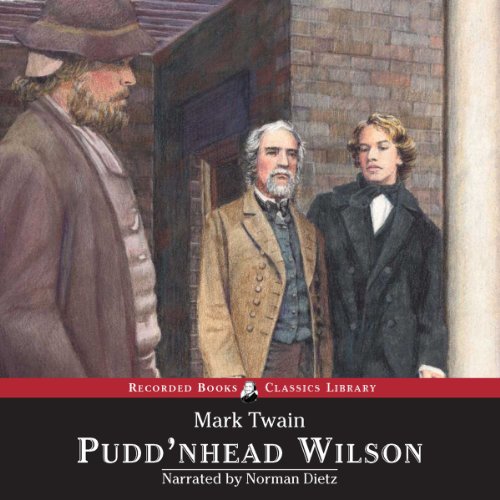-
Pudd'nhead Wilson
Langston Twain, Mark;Hughes
Mass Market Paperback (Bantam Books, Jan. 1, 1959)None
-
Puddnhead Wilson
Mark Twain
Audio Cassette (Blackstone Pub, Dec. 1, 1982)Written as a chronicle, this story covers 25 years in the life of a few select citizens of Dawson's Landing, Missouri. 4 cassettes.
-
Pudd'nhead Wilson
Mark Twain
Paperback (ICON Group International, Inc., Jan. 1, 2008)Webster's paperbacks take advantage of the fact that classics are frequently assigned readings in English courses. By using a running English-to-Albanian thesaurus at the bottom of each page, this edition of Pudd'nhead Wilson by Mark Twain was edited for three audiences. The first includes Albanian-speaking students enrolled in an English Language Program (ELP), an English as a Foreign Language (EFL) program, an English as a Second Language Program (ESL), or in a TOEFL� or TOEIC� preparation program. The second audience includes English-speaking students enrolled in bilingual education programs or Albanian speakers enrolled in English-speaking schools. The third audience consists of students who are actively building their vocabularies in Albanian in order to take foreign service, translation certification, Advanced Placement� (AP�) or similar examinations. By using the Webster's Albanian Thesaurus Edition when assigned for an English course, the reader can enrich their vocabulary in anticipation of an examination in Albanian or English.<br>TOEFL�, TOEIC�, AP� and Advanced Placement� are trademarks of the Educational Testing Service which has neither reviewed nor endorsed this book. All rights reserved. Z
Z
-
Puddnhead Wilson
Mark Twain
Audio Cassette (Literate Ear, Feb. 1, 1991)None
-
Pudd'nhead Wilson
Mark Twain
The setting is the fictional frontier town of Dawson's Landing on the banks of the Mississippi River in the first half of the 19th century. David Wilson, a young lawyer, moves to town, and a clever remark of his is misunderstood, which causes locals to brand him a "pudd'nhead" (nitwit). His hobby of collecting fingerprints does not raise his standing in the eyes of the townsfolk, who consider him to be eccentric and do not frequent his law practice."Pudd'nhead" Wilson is left in the background as the focus shifts to the slave Roxy, her son, and the family they serve. Roxy is one-sixteenth black and majority white, and her son Valet de Chambre (referred to as "Chambers") is 1/32 black. Roxy is principally charged with caring for her inattentive master's infant son Tom Driscoll, who is the same age as her own son. After fellow slaves are caught stealing and are nearly sold "down the river" to a master in the Deep South, Roxy fears for her son and herself. She considers killing her boy and herself, but decides to switch Chambers and Tom in their cribs to give her son a life of freedom and privilege.The narrative moves forward two decades. Tom Driscoll (formerly Valet de Chambre), has been raised to believe that he is white and has become a spoiled aristocrat. He is a selfish and dissolute young man. Tom's father has died and granted Roxy her freedom in his will. She worked for a time on river boats, and saved money for her retirement. When she finally is able to retire, she discovers that her bank has failed and all of her savings are gone. She returns to Dawson's Landing to ask for money from Tom.Tom responds to Roxy with derision. She tells him the truth about his ancestry and that he is her son and partially black; she blackmails him into financially supporting her.Twin Italian noblemen visit Dawson's Landing to some fanfare, and Tom quarrels with one. Desperate for money, Tom robs and murders his wealthy uncle and the blame falls wrongly on one of the Italians. From that point, the novel proceeds as a crime novel. In a courtroom scene, the whole mystery is solved when Wilson demonstrates, through fingerprints, both that Tom is the murderer, and not the true Driscoll heir.Although the real Tom Driscoll is restored to his rights, his life changes for the worse. Having been raised as a slave, he feels intense unease in white society. At the same time, as a white man, he is essentially excluded from the company of blacks.In a final twist, the creditors of Tom's father's estate successfully petition the governor to have Tom's (Chambers) prison sentence overturned. Shown to be born to a slave mother, he is classified as a slave and is legally included among the property assets of the estate. He is sold "downriver", helping the creditors recoup their losses.
-
Pudd'nhead Wilson
Mark Twain, Charles Dudley Warner
Hardcover (Wentworth Press, March 24, 2019)This work has been selected by scholars as being culturally important, and is part of the knowledge base of civilization as we know it. This work was reproduced from the original artifact, and remains as true to the original work as possible. Therefore, you will see the original copyright references, library stamps (as most of these works have been housed in our most important libraries around the world), and other notations in the work.This work is in the public domain in the United States of America, and possibly other nations. Within the United States, you may freely copy and distribute this work, as no entity (individual or corporate) has a copyright on the body of the work.As a reproduction of a historical artifact, this work may contain missing or blurred pages, poor pictures, errant marks, etc. Scholars believe, and we concur, that this work is important enough to be preserved, reproduced, and made generally available to the public. We appreciate your support of the preservation process, and thank you for being an important part of keeping this knowledge alive and relevant.
-
Pudd'nhead Wilson by Mark Twain
Mark Twain
Hardcover (Palala Press, Jan. 1, 1747)None
-
Pudd'nhead Wilson
Mark Twain, Louis Budd, David Baldacci
Mass Market Paperback (Signet, Jan. 1, 2035)This classic satire of pre-Civil War era Mississippi from the author of Adventures of Huckleberry Finn and The Adventures of Tom Sawyer introduces one of Mark Twain’s most beloved characters, Pudd’nhead Wilson.Set in a town on the Mississippi during the pre-Civil War era, Pudd’nhead Wilson tackles the seminal American issue of slavery in a tragicomedy of switched identities. What happens when a child born free and a child born a slave change places? The result is a biting social commentary with enduring relevance, and a good old-fashioned murder mystery. It also introduces one of Twain’s favorite characters: Pudd’nhead Wilson, an intellectual with a penchant for amateur sleuthing. F.R. Leavis proclaimed this novel “the masterly work of a great writer.”With an introduction by Louis J. Budd and a new afterword by David Baldacci Z+
Z+
-
Pudd'nhead Wilson
Mark Twain
Paperback (Independently published, Oct. 17, 2019)Pudd'nhead Wilson (1894) is a novel by American writer Mark Twain. Its central intrigue revolves around two boys—one, born into slavery, with 1/32 black ancestry; the other, white, born to be the master of the house. The two boys, who look similar, are switched at infancy. Each grows into the other's social role.PlotThe setting is the fictional Missouri frontier town of Dawson's Landing on the banks of the Mississippi River in the first half of the 19th century. David Wilson, a young lawyer, moves to town, and a clever remark of his is misunderstood, which causes locals to brand him a "pudd'nhead" (nitwit). His hobby of collecting fingerprints does not raise his standing in the eyes of the townsfolk, who consider him to be eccentric and do not frequent his law practice. Z
Z
-
Pudd'nhead Wilson
Mark Twain, Charles Dudley Warner
Hardcover (Palala Press, Dec. 6, 2015)This work has been selected by scholars as being culturally important, and is part of the knowledge base of civilization as we know it. This work was reproduced from the original artifact, and remains as true to the original work as possible. Therefore, you will see the original copyright references, library stamps (as most of these works have been housed in our most important libraries around the world), and other notations in the work.This work is in the public domain in the United States of America, and possibly other nations. Within the United States, you may freely copy and distribute this work, as no entity (individual or corporate) has a copyright on the body of the work.As a reproduction of a historical artifact, this work may contain missing or blurred pages, poor pictures, errant marks, etc. Scholars believe, and we concur, that this work is important enough to be preserved, reproduced, and made generally available to the public. We appreciate your support of the preservation process, and thank you for being an important part of keeping this knowledge alive and relevant. Z
Z
-
Pudd'nhead Wilson
Mark Twain, Norman Dietz, Recorded Books
Audiobook (Recorded Books, Dec. 16, 1999)Roxy, a slave who is only one-sixteenth black, serves as a nanny to her master's son, Tom Driscoll, who was born the same day as her own son, Chambers. Afraid that Chambers will one day be sold to another family, Roxy switches the two infants, who look almost exactly alike. Only Pudd'nhead Wilson, the town's laughing-stock, is able to figure out her ruse and set things right. Written during a period of great tragedy in Mark Twain's life and great social unrest in America, Pudd'nhead Wilson rises above its farcical plot to ask pointed philosophical questions about society, values, and racism.
-
Pudd'nhead Wilson
Mark Twain, Charles Dudley Warner
Paperback (Palala Press, Feb. 22, 2018)This work has been selected by scholars as being culturally important, and is part of the knowledge base of civilization as we know it. This work was reproduced from the original artifact, and remains as true to the original work as possible. Therefore, you will see the original copyright references, library stamps (as most of these works have been housed in our most important libraries around the world), and other notations in the work.This work is in the public domain in the United States of America, and possibly other nations. Within the United States, you may freely copy and distribute this work, as no entity (individual or corporate) has a copyright on the body of the work.As a reproduction of a historical artifact, this work may contain missing or blurred pages, poor pictures, errant marks, etc. Scholars believe, and we concur, that this work is important enough to be preserved, reproduced, and made generally available to the public. We appreciate your support of the preservation process, and thank you for being an important part of keeping this knowledge alive and relevant. Z
Z